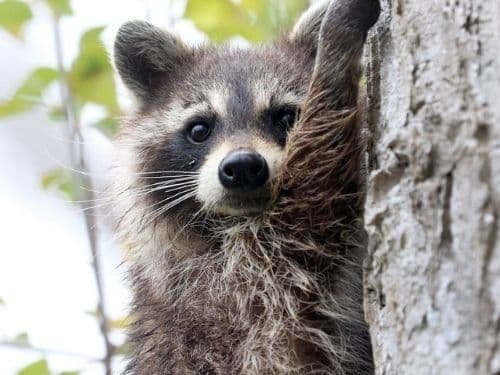It is not so rare to find baby animals, especially if you live in contact with nature. In the case of baby raccoons, you may find one for several reasons: the mother may be dead and the raccoon is gone; the mother changed her den and had to leave the little raccoon behind or, simply, the mother is close and the little one went alone to discover the world. Call our raccoon removal Kitchener services for professional baby raccoon relocation solutions.
But what to do in these situations?
First, you need to make sure the baby raccoon is really an orphan. Most likely the mother is near and is sleeping and he is just looking for more food or has left the den out of curiosity. The best thing to do is to wait and check if the raccoon mom is going to get its baby back. This is the best thing to do also because, as much as you can raise a raccoon and then leave it in nature, the best thing for a baby raccoon is to be with its mom.
When you are 100% certain that it is an orphaned baby raccoon, the best thing to do is to bring them to an authorized wildlife rehab center, so that you can be sure that they can take care of the puppy or puppies. But how do you do it?
Here’s how to do it safely:
- Use a box: Taking care that they are calm, and using a pair of gloves, put the baby raccoon in a cardboard box so that you can transport it safely and comfortably for both you and the raccoon. If you have it, your best bet would be a dog or cat carrier. In any case, some specialists may also come directly to retrieve the puppy if necessary.
- Keep it warm: Don’t forget to put a hot water bottle wrapped in the towel or a warming blanket in the box. Baby raccoons must stay warm, the average temperature of a raccoon must be around 101-103 ° F, but they are often colder because they have short hair. Especially if they are cold, remember to heat them, but not too quickly or with too high temperatures.
- Don’t feed him: Absolutely not. Not only can they live long without food, so food isn’t an emergency, but many foods could kill them, like cow’s milk. Many foods present in the home, in general, could cause a lot of damage to baby raccoons, especially if dehydrated, even those for animals. Do not risk.
In any case, you don’t even have to intervene too quickly to help him. As we have said, the mother may be close and acting too quickly could prevent the baby raccoon from returning with the mother. In the meantime, remember to stay at a safe distance, as raccoons are carriers of diseases and the mother could also attack you to defend the puppy.
Don’t give in to the temptation to take a baby raccoon as a pet. A baby raccoon requires very specialized care that you would almost certainly not be able to give, easily causing damage.

